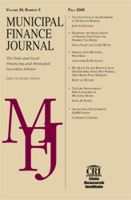An Empirical Examination of Revenue Forecasting Techniques in Local Governments
Author: Christopher G. Reddick, Ph.D..
Source: Volume 24, Number 04, Winter 2004 , pp.35-48(14)

< previous article |next article > |return to table of contents
Abstract:
This article empirically examines the effect of expert, trend, deterministic, and econometric forecasting on municipal governments in the United States. It is specifically concerned with discerning the extent of adoption and impact of causal-based techniques of deterministic and econometric forecasting using the dataset from the International City/County Management Revenue Estimation survey of finance and budget officers.The results indicate the most consistent support for municipal government’s use of deterministic and econometric forecasting techniques. Such issues as the forecaster’s being a budget officer and having training in public administration, the state of the economy, a council-manager form of government, and fiscal stress all had positive impacts on the use of trend forecasting. In addition, a forecaster’s having a graduate degree, training in public administration, and access to prior years of data, as well as city’s population growth and growth in personal income had a positive impact on the use of econometric forecasting.Keywords:
Affiliations:
1: Department of Public Administration, University of Texas at San Antonio.